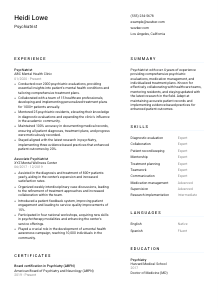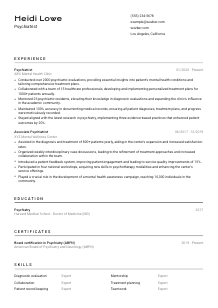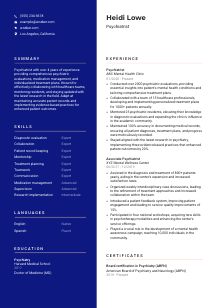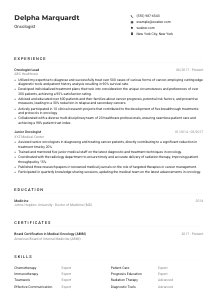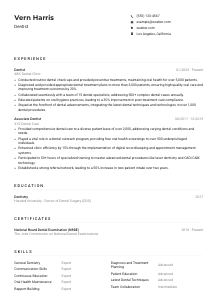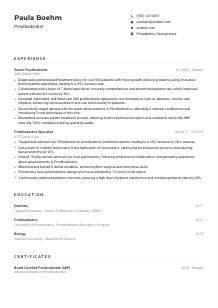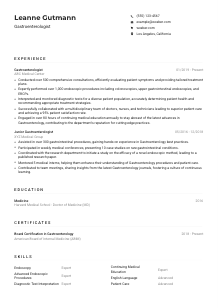Psychiatrist Resume Example
Delving into minds, but your resume feels off track? Navigate this Psychiatrist resume example, mapped out with Wozber free resume builder. Learn how to showcase your therapeutic insights and medical acumen to align with job expectations, blending both your professional and personal sides to find career serenity!
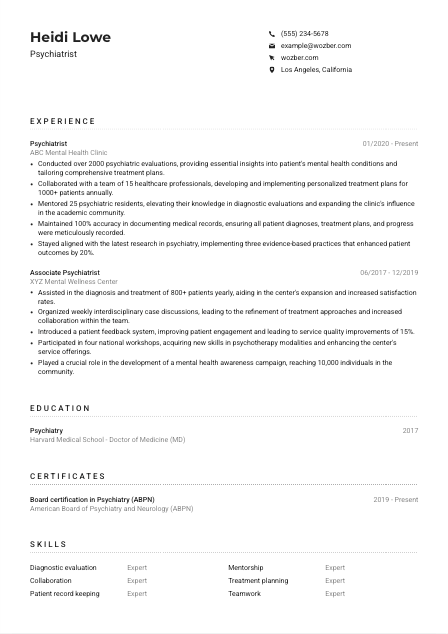
How to write a Psychiatrist Resume?
Embarking on your journey as a Psychiatrist involves more than just having the right qualifications; it necessitates a resume that speaks volumes about your expertise, dedication, and the unique value you bring to the table. With mental health's increasing importance in our society, your role becomes even more pivotal. This guide, powered by Wozber's free resume builder, is here to show you how to draft a resume that is not only ATS-compliant but resonates deeply with the core of being a Psychiatrist.
Through each step, we'll cater specifically to your profession, making your resume as engaging and effective as possible.
Personal Details
In the competitive field of Psychiatry, your resume's Personal Details section isn't a mere formality—it's an integral part of your professional narrative. In this era where personal branding is key, how you present your personal information can set the tone for the rest of your resume. Let's explore how to craft this section to align distinctly with a Psychiatrist's role while keeping it ATS-friendly.
1. Your Identity
Start strong by ensuring your name is unmissable. Employ a clear, professional font that whispers sophistication. As a Psychiatrist, you understand the subtleties of perception. Apply this by choosing a font and size that stands out yet remains elegant.
2. Fitting Your Title
Directly beneath your name, position yourself as a candidate by including the job title 'Psychiatrist'. This does more than just clarify your desired role; it's a nod to your understanding of the industry's language, immediately positioning you as an insider.
3. Essential Contact Info
Include your phone number and a professional email address. Precision here is crucial—double-check for accuracy. Remember, as a Psychiatrist, every detail counts in demonstrating your meticulous nature.
4. Geographic Consideration
The job specifies "Must be located in Los Angeles, California". Echo this requirement by mentioning your Los Angeles location, subtly reinforcing your suitability without a word about relocation.
5. The Professional Touch
Adding a link to a professional profile or personal website can provide a deeper dive into your credentials. As a Psychiatrist, consider a professional-looking LinkedIn profile that echoes the depth of your experience and the breadth of your knowledge.
Takeaway
The Personal Details section, though brief, is potent. It's your first impression, where every detail can speak volumes. Craft it with the same care and attention to detail you would give to a patient's treatment plan. This is the first step to differentiate yourself in a sea of candidates.





Experience
The Experience section is where your resume truly begins to demonstrate your suitability for the role. Here, we'll delve into how to highlight your professional journey, drawing upon your experiences in Psychiatry to craft a narrative that resonates with hiring managers.
- Conducted over 2000 psychiatric evaluations, providing essential insights into patient's mental health conditions and tailoring comprehensive treatment plans.
- Collaborated with a team of 15 healthcare professionals, developing and implementing personalized treatment plans for 1000+ patients annually.
- Mentored 25 psychiatric residents, elevating their knowledge in diagnostic evaluations and expanding the clinic's influence in the academic community.
- Maintained 100% accuracy in documenting medical records, ensuring all patient diagnoses, treatment plans, and progress were meticulously recorded.
- Stayed aligned with the latest research in psychiatry, implementing three evidence‑based practices that enhanced patient outcomes by 20%.
- Assisted in the diagnosis and treatment of 800+ patients yearly, aiding in the center's expansion and increased satisfaction rates.
- Organized weekly interdisciplinary case discussions, leading to the refinement of treatment approaches and increased collaboration within the team.
- Introduced a patient feedback system, improving patient engagement and leading to service quality improvements of 15%.
- Participated in four national workshops, acquiring new skills in psychotherapy modalities and enhancing the center's service offerings.
- Played a crucial role in the development of a mental health awareness campaign, reaching 10,000 individuals in the community.
1. Dissecting the Job Description
Analyze the job requirements critically. For example, 'Conduct psychiatric evaluations' and 'Provide supervision to psychiatric residents' are tasks that should mirror in your own achievements, indicating that you're not just a fit but a standout candidate.
2. Layout: Roles and Tenures
Present your experience in reverse chronological order. By detailing your roles and the duration spent at each, you provide a clear trajectory of your growth in the field of Psychiatry.
3. Achievement-Focused Descriptions
Go beyond listing duties. Highlight your accomplishments, such as "Conducted over 2000 psychiatric evaluations," as this quantifies your experience and underscores your capacity to handle substantial responsibilities.
4. Quantification Adds Clarity
Whenever possible, use numbers to make your achievements tangible. For instance, mentioning 'improved patient outcomes by 20%' provides a measurable impact of your work, offering a concrete glimpse into your effectiveness as a Psychiatrist.
5. Relevance Reigns Supreme
Every detail should underscore your candidacy for the Psychiatrist role. Irrelevant achievements, no matter how impressive, can distract from your fit for this specific position. Scrutinize every bullet point through the lens of the job description.
Takeaway
Think of the Experience section as your professional narrative—a story that conveys your journey, achievements, and the distinctive value you bring as a Psychiatrist. Use it to paint a compelling picture of your career, one that captivates and convinces hiring managers that you're the asset they need.
Education
In the field of Psychiatry, where education and credentials speak volumes, your Education section is more than just a formality. It's a testament to your dedication, expertise, and readiness for the role. Let's tailor it to highlight how your academic background makes you the ideal candidate.
1. Match the Educational Criteria
Identify the educational requirements directly from the job posting—like a 'Doctor of Medicine (MD) degree from an accredited medical school'—and ensure your highest relevant degree is prominently displayed.
2. The Art of Simplification
Keep this section clear and focused. List your degree, the field of study, the institution, and graduation year. For instance, 'Doctor of Medicine (MD), Psychiatry, Harvard Medical School, 2017' tells your educational story efficiently and elegantly.
3. Degree Specificity
It's essential to match your degree title as closely as possible to the job requirements. If you're board-certified or eligible in Psychiatry, make sure this is clear, as it directly correlates to the job's specifications.
4. Coursework and Honors
While not always necessary, mentioning relevant coursework, honors, or distinctions can add depth for early career Psychiatrists or when applying to academic or research-focused roles.
5. Continuous Learning
In a field as evolving as Psychiatry, showcasing your commitment to ongoing education can be beneficial. This could include certifications, workshops, or seminars relevant to the practice of Psychiatry, even if they were completed after your degrees.
Takeaway
Your Education section is a testament to your professional journey's beginnings. Curate it to not just fulfill but enhance the job requirements, showcasing your preparedness and dedication to the Psychiatry profession.
Certificates
In Psychiatry, certifications can distinguish you from other candidates by demonstrating your commitment to your specialization and ongoing professional development. Here's how to strategically showcase certifications to resonate with your desired role.
1. Highlighting Key Credentials
The job description calls for specific certifications, such as 'Board certification in Psychiatry from the ABPN'. Ensure these are prominently listed, indicating your fulfillment of these essential criteria.
2. Prioritize Pertinence
Include certifications that directly relate to the job requirements or the field of Psychiatry. This selective approach ensures that each listed certification reinforces your expertise and relevance.
3. Date Deliberation
When certifications have expiration dates or were particularly recent achievements, include these details. It conveys your current expertise and commitment to staying updated in your field.
4. Embrace Evolution
Keep pursuing relevant certifications and include them in your resume. This signals to potential employers your dedication to professional growth and adaptability—traits invaluable in the dynamic field of Psychiatry.
Takeaway
Carefully chosen certifications paint a picture of a Psychiatrist who is not only accomplished but also continuously evolving. Let your certifications section be a testament to your dedication to excellence in Psychiatry.
Skills
The Skills section is where your technical prowess meets your soft skills, painting a comprehensive picture of your professional capabilities. For a Psychiatrist, this section is a succinct showcase of the competencies that make you exceptional.
1. Synthesize the Job Requirements
Examine the job description for both hard and soft skills. For instance, 'diagnostic evaluation' and 'collaboration' are skills that, once listed, highlight your direct alignment with the job's needs.
2. Crafting a Concise List
Focus on listing skills that you excel in and that are most relevant to the job. This not only makes your resume more targeted but also simplifies it for hiring managers and ATS systems alike.
3. Organization is Key
Arrange your skills in a manner that balances hard and soft skills, showing your multifaceted capabilities. As a Psychiatrist, this might mean prioritizing diagnostic and treatment planning skills, followed by interpersonal and communication skills.
Takeaway
Your skills section is a succinct testament to your capabilities. As a Psychiatrist, highlighting a balanced mix of technical and soft skills demonstrates your comprehensive expertise and your understanding of the nuances of patient care.
Languages
In a globally connected world and diverse communities, the ability to communicate in multiple languages can set you apart. Here's how to strategically present your language skills to enhance your candidacy as a Psychiatrist.
1. Job Description Alignment
If the job specifically requires proficiency in certain languages—such as English for this role—ensure those are listed prominently to immediately address the requirement.
2. Prioritize and Profess
List languages in order of relevance and proficiency. As being able to articulate effectively in English is required, highlight it as 'Native' or 'Fluent', followed by any additional languages.
3. Honesty in Proficiency
Clearly state your level of proficiency in each language using terms like 'Native', 'Fluent', 'Intermediate', and 'Basic'. This honesty showcases your integrity and self-awareness.
4. The More, the Merrier
While the job might specify a particular language, additional languages you speak can set you apart, showcasing your ability to engage with a diverse clientele or participate in international collaborations.
5. Role Relevance
Assess how your linguistic skills can benefit your role as a Psychiatrist. For instance, being fluent in Spanish in a bilingual city can significantly enhance your practice's scope and patient base.
Takeaway
Your linguistic skills are not just a personal attribute; they are professional tools that enhance your ability to connect, understand, and treat a broader range of patients. Highlighting your languages can be a powerful addition to your resume, demonstrating your readiness to serve diverse communities.
Summary
The Summary section is your chance to encapsulate your essence as a Psychiatrist. It's where you weave your qualifications, experiences, and personal zeal into a narrative that captures and holds attention. Here's how to make your Summary both memorable and impactful.
1. Core Understanding
Reflect on the job requirements and how your experience aligns. Your summary should open with a strong statement that positions you as a dedicated and skilled Psychiatrist. For example, 'Psychiatrist with over 4 years of experience...' not only defines your role but sets an experienced tone.
2. Highlight Relevance
Mention key achievements and skills that align with the job's demands. Focus on experiences like 'providing comprehensive psychiatric evaluations' and 'mentoring residents' to demonstrate your active contribution and impact in the field.
3. Brevity and Impact
Your summary should be a compelling teaser of what's to follow, not an exhaustive account. Keep it concise, aiming for three to five lines that encapsulate your most significant and relevant achievements.
4. Capture the Inner Essence
Conclude with a touch that's uniquely you, whether it's a dedication to 'implementing evidence-based practices' or a passion for 'enhancing patient outcomes'. This personal insight offers a glimpse into not only the Psychiatrist you are but the individual behind the profession.
Takeaway
Consider your Summary the elevator pitch of your resume. It should intrigue, captivate, and make hiring managers eager to read on. By concisely summarizing your credentials and passions, you set the stage for the detailed narrative that your resume will unfold.
Setting Forth with Confidence
You're now equipped with the knowledge and insights to craft a resume that not only ticks the boxes but speaks to the heart of what it means to be a Psychiatrist. Utilize Wozber free resume builder, with its ATS-friendly resume templates and ATS resume scanner, to ensure your resume not only stands out to hiring managers but also navigates the intricacies of ATS systems with ease. Your journey is about more than securing a job; it's about making a difference in the world of mental health.
Let your resume be the key that opens doors to new opportunities and the start of a rewarding path ahead. Forge ahead with clarity, confidence, and the assurance that your unique contribution is needed and valued.

- Doctor of Medicine (MD) or Doctor of Osteopathic Medicine (DO) degree from an accredited medical school.
- Completion of a four-year psychiatry residency program.
- Board certification or eligibility in Psychiatry from the American Board of Psychiatry and Neurology (ABPN).
- Valid state medical license with a DEA registration and ability to pass state background checks.
- Demonstrated expertise in diagnostic evaluation and medication management for a broad range of psychiatric disorders.
- Ability to effectively articulate in English required.
- Must be located in Los Angeles, California.
- Conduct psychiatric evaluations and provide ongoing medication management for patients with mental health conditions.
- Collaborate with a multidisciplinary team to develop and implement individualized treatment plans for patients.
- Stay up-to-date with the latest research in psychiatry and implement evidence-based practices into patient care.
- Provide supervision and mentorship to psychiatric residents and medical students as part of an academic setting, if applicable.
- Maintain accurate and confidential medical records, documenting all patient diagnoses, treatment plans, and progress.





